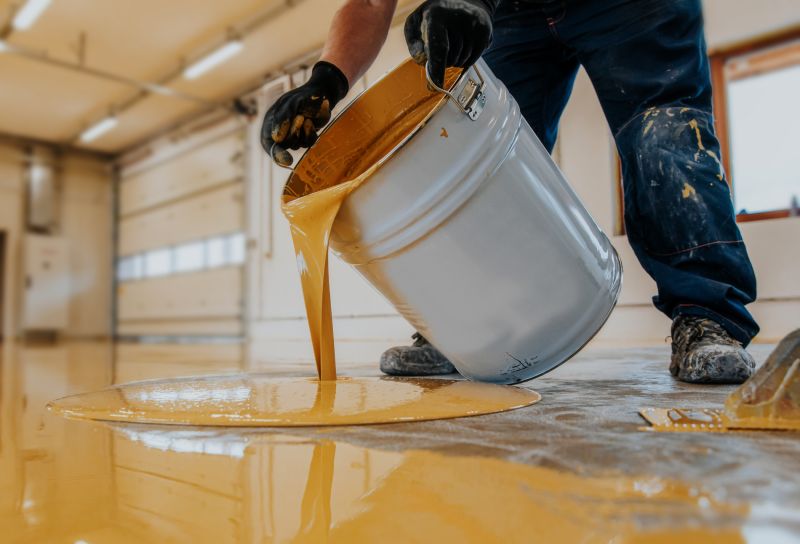Top-Rated Garage Floor Epoxy Paintings For Professional-Quality Finishes
Explore products favored by experts for achieving a smooth, durable, and visually appealing epoxy-coated garage floor.
 Garage floor epoxy painting is a popular solution for enhancing the durability and appearance of garage surfaces. Epoxy coatings are known for their strong adhesion properties, resistance to chemicals, and ability to withstand heavy foot and vehicle traffic. When selecting epoxy products for garage floors, it is important to consider factors such as surface preparation, application method, and the specific type of epoxy formulation. Properly applied epoxy coatings can provide a seamless, glossy finish that not only improves aesthetics but also helps protect the underlying concrete from stains, cracks, and wear.
Garage floor epoxy painting is a popular solution for enhancing the durability and appearance of garage surfaces. Epoxy coatings are known for their strong adhesion properties, resistance to chemicals, and ability to withstand heavy foot and vehicle traffic. When selecting epoxy products for garage floors, it is important to consider factors such as surface preparation, application method, and the specific type of epoxy formulation. Properly applied epoxy coatings can provide a seamless, glossy finish that not only improves aesthetics but also helps protect the underlying concrete from stains, cracks, and wear.
Top Overall Option
Multi-Component Epoxy Floor Coating System
A versatile multi-component epoxy system offers a durable and customizable finish suitable for various garage environments. It typically includes a base resin, hardener, and optional additives to tailor the coating's properties. This type of epoxy provides strong adhesion, chemical resistance, and a glossy surface when properly mixed and applied. Its flexibility makes it a popular choice for both DIY enthusiasts and professionals seeking reliable results with a long-lasting finish.
Types of Products For Garage Floor Epoxy Paintings
Solid Epoxy Coatings
Thick, durable coatings that form a seamless surface, ideal for high-traffic garage floors.
Epoxy Paints
Simpler to apply, these paints offer a protective and decorative finish with easier preparation.
Self-Leveling Epoxy
Designed to create a smooth, even surface, perfect for uneven or cracked floors.
Quartz-Loaded Epoxy
Contains embedded quartz particles for added slip resistance and textured appearance.
Solid Color Epoxy
Provides a uniform, vibrant color finish for a clean look.
Clear Epoxy Coatings
Translucent finishes that enhance the natural look of concrete or decorative aggregates.
High-Gloss Epoxy
Offers a shiny, reflective surface for a polished appearance.
Matte Epoxy
Provides a non-reflective, subdued finish that hides imperfections.
UV-Resistant Epoxy
Formulated to resist yellowing and degradation from sunlight exposure.
Fast-Drying Epoxy
Designed for quicker curing times, suitable for projects with tight schedules.
Low-VOC Epoxy
Formulated with reduced volatile organic compounds for lower odor and emissions.
Hybrid Epoxy Systems
Combine features of epoxy paints and solid coatings for customized performance.
Epoxy Primer
Used as a preparatory coat to improve adhesion and durability of the topcoat.
Epoxy Sealers
Provide an additional protective layer to enhance longevity and resistance.
Decorative Flake Epoxy
Includes decorative flakes for textured, visually appealing finishes.
Anti-Slip Epoxy
Formulated with additives to improve traction and safety.
Commercial Grade Epoxy
Heavy-duty formulations designed for industrial or commercial garage environments.
Popular Choices
All-in-one kits that include everything needed for a straightforward application process.
Favored for creating smooth, even surfaces with minimal effort.
Popular for providing slip resistance and a textured finish.
Chosen for its shiny, reflective surface that enhances visual appeal.
Preferred in areas exposed to sunlight for maintaining clarity and color.
Ideal for projects requiring quick turnaround times.
Popular among those seeking lower odor and emissions during application.
Adds visual interest and texture, suitable for decorative purposes.
Enhances safety in high-traffic or wet areas within garages.
Often selected for its durability in demanding environments.
Choosing the right epoxy product depends on various factors including the level of traffic, exposure to chemicals, and desired finish. Some epoxy products are designed for DIY applications, featuring user-friendly mixing and application instructions, while others may be better suited for professional installation. Additionally, epoxy coatings come in various formulations, such as solid epoxies, epoxy paints, and hybrid systems, each offering different levels of thickness, durability, and ease of use.
Preparation is key when applying epoxy to garage floors. Surface cleaning, repairing cracks, and etching the concrete are essential steps to ensure proper adhesion. Many epoxy products include primer or bonding agents to enhance adhesion to the concrete surface. Once applied, epoxy coatings typically require curing time, during which the floor should remain undisturbed to achieve optimal results. Regular maintenance, such as cleaning with mild detergents, can help prolong the lifespan of the epoxy finish.
Overall, selecting the right epoxy product involves balancing factors like ease of application, durability, finish appearance, and budget. The variety of available options allows homeowners and professionals to find suitable solutions tailored to their specific garage environment and aesthetic preferences. Properly chosen and applied epoxy coatings can significantly improve the functionality and look of garage floors, creating a clean, professional appearance that can last for years.
Key Buying Considerations
- Surface preparation requirements, including cleaning and etching, to ensure proper adhesion.
- Type of epoxy formulation suited for your specific needs, such as solid, paint, or hybrid systems.
- Application method and ease of use, especially for DIY projects versus professional installation.
- Curing time and whether it fits your project schedule.
- Durability and resistance features, including chemical, impact, and scratch resistance.
- Finish appearance, such as gloss, matte, or textured options.
- Slip resistance features, particularly for areas prone to moisture or spills.
- UV stability if the garage is exposed to sunlight to prevent yellowing or degradation.
- Compatibility with existing coatings or surface conditions.
- Budget considerations, balancing cost with desired performance and longevity.
- Environmental and safety factors, including VOC content and odor during application.
- Availability of primers or sealers that enhance adhesion and protection.
- Maintenance requirements for keeping the epoxy finish in good condition.
- Compatibility with decorative elements like flakes or embedded aggregates.
- Manufacturer reputation and product reviews for reliability and support.
